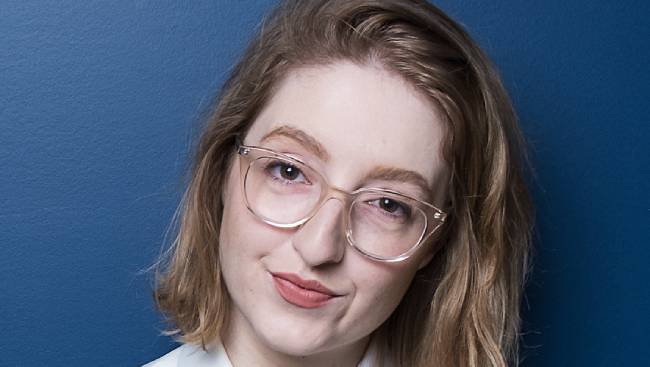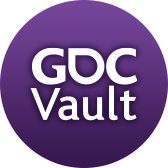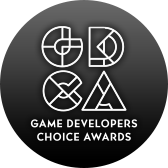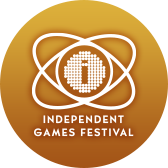Gabby DaRienzo is sr. artist at Guacamelee developer Drinkbox Studios, was art director on the Independent Games Festival finalist A Mortician's Tale, and worked on games including Super Crush KO, Parkitect, and Celeste. On the latest episode of the GDC Podcast, this fabulous goth-adjacent Forbes 30 under 30 game developer talked about art, creativity, burnout, and of course, death.
Listen now on iTunes, Google Play Music, and Spotify
DaRienzo joined Gamasutra's Kris Graft and a mysterious temporary co-host known only as "Alex" to educate us on all things art, the life of a (former) freelancer, and if you listen closely, you can hear her cats Bastion and Meredith aggressively agreeing with everything she says. Here are a few highlights.
GDC Podcast music by Mike Meehan.
Gabby on dealing with and avoiding burnout
"I think creative work--any work in general, there's only so much you can do before you get burnt out--but creative work, whether it's art or writing or even thinking of concepts for games--is especially tiring. [You] have to context-switch constantly, and I think that burnt me out. The team I was working with [no one] was pushing me to do this. This was just entirely self-imposed.
"...In hindsight it was very clear. I was getting frustrated and just was making a lot of really bad decisions. A lot of it was I felt the pressure to have to get it right, that I didn't have time to concept and think of ideas, that I just had to get it right immediately. And we know that's not the way anything works. Games especially are a very iterative process. They change so much, they evolve so much over the development. And setting up this expectation to get it right the first time--not realistic.
"And I was pushing myself to do it not just for one game, but for two games [at once], and that really messed me up because I was like, 'If I don't get this right if this art isn't completely unique then these games won't sell and these companies will go under!' That sounds really so bizarre and so huge but when I talk to a lot of game developers, that's kind of how they feel. A lot of it is that the indie space in general is very...there's a lot going on right now and a lot of people are just kind of panicking. So that panicking on top of thinking about art, working on two things at once and just coming off of a game that was very personal just all added up to burnout."
The signs of burnout
"...A lot of the signs are just feeling really frustrated, feeling really unmotivated--I really did not want to work on these games at all. In my headspace I was really excited about these two projects, but when came down to sitting down and doing the work, I just didn't want to do it; I just could not push myself to do it.
"It's also things like I got really defensive. I got very defensive about my own art. Which is something I'm embarrassed to talk about, embarrassed to admit, but is kind of important to speak about because I see a lot of other artists go through the same thing. My cofounder [at her studio Laundry Bear] would be like 'oh I think this art would be good' and I'd like 'WHAT?! What's wrong with my art?!'" (laughs)
"...If you're a person who thinks you might be burnt out or you know someone who might be burnt out, I think that's a huge sign, someone getting very defensive about the work that they're doing."
"Burnout is such a big deal. When we think about burnout and we hear the term 'burnout,' especially in games, we often think about triple-A: big studios forcing their employees to work...But a lot of people, especially indie devs, we need to consider that a lot of it is self-imposed. We're putting it on ourselves without even realizing it...I know a lot of indie devs that don't notice they're doing it or they're doing it because [they think] you can't be indie unless you work 16-hour days. And that's just not true."
Gabby on her past life as a freelancer, and what it takes to be a freelance artist
"I think the biggest thing is--a lot of people don't think about this when they want to do freelance--but it's like 20 percent just admin and accounting. You're not just 100 percent of the time doing art or game design or programming or writing or whatever it is that you're doing freelance. You're basically running a business. So a lot of your time is spent responding to emails, doing accounting.
"But it's also things like self-marketing, putting yourself out there on social media, going to events, making sure your portfolio is always stocked with pieces, and if you have a slow period with work, making sure you use that time to find more work or fill your portfolio with pieces that will help you get more work. It's a lot of that kind of stuff.
"If you're a person who's maybe not keen on that, then freelancing might not be a thing that you're interested in doing. But I love that stuff (laughs)."
"...A lot of it too is networking. I hate the term 'networking.' It feels really business-professional and seems like a contrast to what we do in games. But essentially [what I mean is] making friends; going to events, being social on the internet and just making friends. And when people are like 'oh, we need an extra artist on a thing' or 'we need to hire someone to do a logo,' they think of you.
"And that's how I got a lot of my work when I was freelancing...You don't have to go to events and shove business cards in peoples' faces, necessarily (laughs), I advise against that, probably. But making friends and putting yourself out there goes a long way if that's something you're comfortable with doing."
Listen to the full episode on iTunes, Google Play Music, and Spotify
Register now GDC 2020, which takes place March 16-20 in San Francisco. Subscribe to regular updates via Facebook, Twitter, or RSS.
Gamasutra and GDC are sibling organizations under parent Informa Tech



